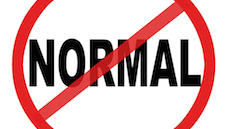Normal, adj.: According to, constituting, or not deviating from, an established norm, rule, or principle
Well, I’d pretty much scratched that one off my list of Things I Want To Be When I Grow Up by the time I was five. The last thing in the world I wanted, even then, was to be like everyone else, and I’ve subsequently worked very hard to avoid the pitfalls of normalcy.
I have, perhaps unfairly to those people who are normal, always equated being normal with cookie cutters: to be normal is to do what everyone else does and think what everyone else thinks. That’s fine if being normal is an unconscious choice. But far too many people are “normal” not so much through choice but because they feel the necessity to follow the cardinal rule for normalcy: “Do what is expected of you and don’t make waves.” Again, that’s fine for those who are truly comfortable obeying rules. I do not like rules.
Have you noticed how even social “rebels”—hippies in the 60s, rappers in the 90s and teenagers of every generation— try to prove their “difference” by looking and acting just like everyone else in their group? I have never felt the need—and certainly not the desire—to have my body covered in tattoos or have various body parts pierced or wear black eyeliner or spiked hair or, back when it was in vogue, a mustache, to call attention to myself. I know I’m different…I have no need to prove it to anyone. (Though, you’ll notice, I apparently have the need to tell people about it.) Not that people don’t notice I’m not quite like them, but I would hope they might have to give some thought to it before reaching the conclusion.
I am sufficiently self-conscious not to want to be considered “abnormal,” or to be so far from what people might think of as normal that I might be pointed out in a crowd, though I am finding that the fact of aging is taking this option out of my hands: I do stand out simply because one look tells people I am no longer like them.
Even within the range of “normal,” each of us is of course different in our own way, some through choice and some through circumstance. I vastly prefer “different by choice” to “different by circumstance.”
I don’t consider my being gay makes me particularly “different.” For one thing it is not a matter of choice, and for another, though gays are in the distinct minority of the general population, the number of gays in the United States far exceeds the entire population of the continent of Australia. But undoubtedly being gay contributed to my aversion to the more blatant outward forms of demonstrating my lack of normalcy. Being part of a persecuted minority tended to create a deep-seated and understandable need to not be easily spotted.
But my awareness of not being “normal” means I’ve never felt comfortable among groups of people I do not know well. Being surrounded by large groups of “normal” (read, for the most part, “heterosexual”) people can be particularly unnerving.
If being normal is your choice, more power to you…I certainly don’t mean to be dismissive of those who freely choose normalcy. Life is infinitely easier for you, I’m sure. But there are far too many people who choose to be normal because it frees them of the need to ask questions—such as why things are as they are, or are not as they should be. To be normal is to be far more accepting of life than I am or have ever cared to be. I can and do respect normal people and perhaps even envy them a bit. But I would never, never want to be one of them!
----------
This blog is from Dorien's ebook of blogs, Short Circuits, available from UntreedReads.com and Amazon.com; it's also available as an audio book from Amazon/Audible.com. You can find information about Dorien's books at his web site: www.doriengrey.com:






No comments:
Post a Comment